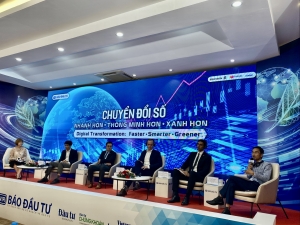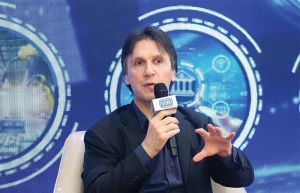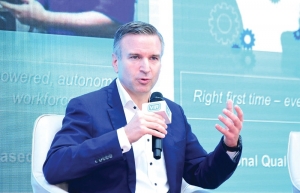Meta on prowl for digital openings
What have been the key highlights in the discussions between Meta and Vietnamese government officials?
 |
| Rafael Frankel, director of Public Policy in Southeast and South Asia for Meta |
In my conversations with different government agencies, it’s apparent digital innovation is a key concern across ministries and agencies. The government is proactively asking Meta to share our international experience as chair of the digital economy committee of the American Chamber of Commerce in Vietnam. We also lead the digital economy taskforce with Vietnam’s Ministry of Information and Communications, as well as the US-ASEAN Business Council.
More specifically, we have partnered with various government agencies in initiatives such as the Vietnam Innovation Challenge with the Ministry of Planning and Investment (MPI), with the Vietnam Government Portal on post-pandemic economic recovery, and training with the Ministry of Foreign Affairs.
For the digital economy landscape, we also need to help local small- and medium-sized enterprises (SMEs) to go abroad and compete in the global market, and this is a key point that the government should understand in terms of maintaining an open and free internet with favourable regulations.
Vietnam now strictly punishes violating online advertisements. How does Meta handle ads that violate Facebook policy and Vietnamese rules?
We have clear and detailed advertising policies, designed to ensure that our ads do not violate our Community Standards, and that they do not link to misleading, spammy, or fraudulent content.
Before adverts appear on Facebook or Instagram, they’re reviewed to make sure that they meet our advertising policies. However, anyone can report an ad on Facebook if they believe it violates them.
Our ad review system relies primarily on automated technology to apply our advertising policies to the millions of ads that are run across our apps. However, we do use human reviewers to improve and train our automated systems, and in some cases, to manually review some ads.
We want advertisers to understand our policies and how our enforcement system works. Account Quality provides a centralised place to monitor issues related to compliance with our advertising policies, Community Standards, and other Facebook policies and terms. However, to protect the effectiveness of our enforcement efforts, we may not share granular details about how our systems identify violations, especially because we don’t want people to use this information to get around our review systems.
We don’t tolerate misleading advertisements or apps on Facebook. Our systems try to catch fraudulent ads even before they are posted on Facebook – but because this is not always possible, we also act when people report ads that violate our policies. We’re grateful to our community for this support, and hope that more transparency will mean more people can report inappropriate ads.
We are working closely with relevant government agencies on this matter and will take appropriate action if the violating ads are made aware to us.
Meta has been cutting down costs and has had to lay off thousands of employees. How does this impact your investment in Vietnam?
Meta is building the future of human connection, and we are making some tough decisions. The goals of this work are to make us a better technology company, and to improve our financial performance in a difficult environment so we can execute our long-term vision.
We closed 2022 with difficult lay-offs and restructuring some teams. When we did this, this was the beginning of our focus on efficiency, not the end. In Vietnam, it means we will focus more on more critical projects and increase the efficiency of how we execute our main priorities. In particular, we will continue investing in key projects that boost innovation such as The Innovation Challenge in partnership with the MPI and support business growth such as the Business Messaging Summit, while making sure our platforms are safe and secure for everyone.
What are your strategies for Vietnam this year in particular?
Vietnam is and has always been a significant country for Meta. In order to enable the digital economy landscape, the government of Vietnam should make a holistic approach to the regulations and support the free flow of information.
The country has shown robust growth in the last few years and has emerged to come at the forefront of international trade. In 2022, according to Bain & Company, there were 60 million digital consumers in Vietnam, which equates to 80 per cent of the population 15 years old and older.
Furthermore, with a young population of over 97 million and a median age of 30 years old, Vietnam is poised to take the digital economy lead in Southeast Asia. Vietnam’s pool of talent is young, hard-working, and has an appetite for new technologies and innovation and can learn rapidly.
SMEs are central to Vietnam’s economic growth, providing significant contributions to job creation, export promotion, and poverty reduction. As such, we are committed to helping unlock growth for Vietnam as it moves towards growing its position as an innovative digital economy through Industry 4.0
We aim to do this by helping businesses embrace the journey to digital, contributing to the country’s economic prosperity, and by better serving the needs of the community through products and tools that help them create meaningful connections and support one another.
 | Digital transformation needs private and public sector support International organisations and investors hope to work closely with the authorities and business community to foster digital transformation, raising demand for public-private partnerships, according to experts and representatives of firms at VIR's forum on Tuesday. |
 | 5G commercialisation – a must to drive the digital vision of Vietnam Vietnam wants to commercialise 5G, thus enabling the country to achieve its digital vision. Denis Brunetti, president of Ericsson in Vietnam, Myanmar, Cambodia and Laos, talked to VIR’s Minh Anh about the key factors in this journey and how the company can support these efforts. |
 | Digitalisation: a story of both technology and people It could be time to adopt a more realistic approach to digitalisation. Urs Kloeti, factory manager at Nestlé Vietnam, explained to VIR’s Van Nguyen why it may not be an appropriate approach to simply pursue external high-tech without first identifying remaining gaps in technology. |
What the stars mean:
★ Poor ★ ★ Promising ★★★ Good ★★★★ Very good ★★★★★ Exceptional
Related Contents
Latest News
More News
- SK Innovation-led consortium wins $2.3 billion LNG project in Nghe An (February 25, 2026 | 07:56)
- THACO opens $70 million manufacturing complex in Danang (February 25, 2026 | 07:54)
- Phu Quoc International Airport expansion approved to meet rising demand (February 24, 2026 | 10:00)
- Bac Giang International Logistics Centre faces land clearance barrier (February 24, 2026 | 08:00)
- Bright prospects abound in European investment (February 19, 2026 | 20:27)
- Internal strengths attest to commitment to progress (February 19, 2026 | 20:13)
- Vietnam, New Zealand seek level-up in ties (February 19, 2026 | 18:06)
- Untapped potential in relations with Indonesia (February 19, 2026 | 17:56)
- German strengths match Vietnamese aspirations (February 19, 2026 | 17:40)
- Kim Long Motor and AOJ Suzhou enter strategic partnership (February 16, 2026 | 13:27)

 Tag:
Tag:


















 Mobile Version
Mobile Version